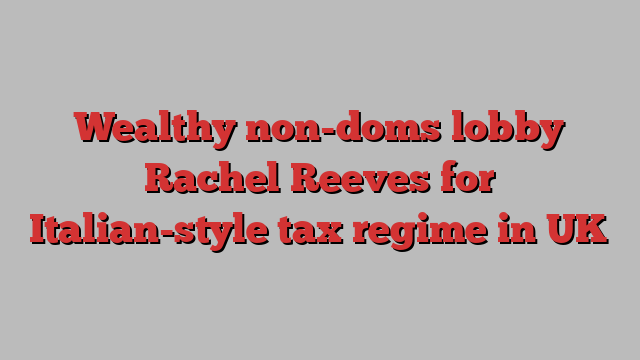
Unlock the Editor’s Digest for free
Roula Khalaf, Editor of the FT, selects her favourite stories in this weekly newsletter.
Wealthy foreigners and their advisers are urging chancellor Rachel Reeves to replace the UK non-dom regime in this month’s Budget with a new system modelled on Italy’s flat-tax system that they say would halt an exodus from Britain.
Foreign Investors for Britain, a lobby group set up after July’s general election, has proposed a so-called tiered tax regime that would exempt non-doms from inheritance tax on non-UK assets and free from UK tax on foreign income, gains and certain UK investments for up to 15 years.
They would pay a tiered annual charge to do this, ranging from a £200,000 charge for net wealth up to £100mn to a £2mn charge for net wealth over £500mn.
The previous Conservative government pledged in March to abolish the non-dom regime that allows wealthy foreign residents to avoid paying UK tax on overseas income, cutting the amount of time that people can benefit from the perks of the status from 15 years to four.
The Labour government confirmed it would implement these changes and pledged to tighten the rules further by removing the ability for non-doms to use trusts to shelter their overseas assets from UK inheritance tax.
Non-doms, their lawyers and tax advisers have urged the government to dilute these proposals, amid warnings that it would bring in little revenue and concerns that wealthy foreigners are already leaving the UK for countries including Italy, Switzerland and the United Arab Emirates.
Their main issue is with the new inheritance tax rules and Reeves is considering dropping this element after being told that making non-doms’ entire global estate subject to UK inheritance tax could cause people to emigrate.

Leslie Macleod-Miller, chief executive of Foreign Investors for Britain, said: “The government is saying that they’re determined to lead the way on growth but we’re concerned they’re leading those who have the ability to partner with the government on growth to other jurisdictions.”
Foreign Investors for Britain’s proposal for a tiered tax regime follows the success of a flat tax that was announced eight years ago in Italy by then prime minister Matteo Renzi’s centre-left administration.
As part of a series of tax breaks designed to reverse the country’s infamous brain drain and lure wealthy foreigners, a newly arrived resident — or an Italian who has lived abroad for at least nine years — can pay a flat tax of €100,000 a year on any foreign income and assets for up to 15 years, and be fully exempt from inheritance tax on foreign assets during that period. In August prime minister Giorgia Meloni’s cabinet approved a rise in the annual levy to €200,000.
Macleod-Miller said that their proposed tiered tax regime for the UK “speaks to reform, gives certainty and is fair because those with the broadest shoulders bear the heavier burden. It has a simplicity to it and will provide real revenue that will go straight into frontline services.”
Reeves hoped to raise £2.6bn over the parliament from her crackdown on non-doms, including £1bn in the first year.
A new report published on Wednesday by consultancy Oxford Economics on behalf of Foreign Investors for Britain suggested that, instead of raising additional revenues, Labour’s proposed non-dom reform could cost £900mn in 2029-30 and said that the lobby group’s alternative proposal would raise £1.1bn for the exchequer in 2029-30.
Foreign Investors for Britain, which is funded by non-doms and their advisers, is due to speak to Downing Street about such a tiered tax regime on Thursday. Last month it presented research to officials at the Treasury and HM Revenue & Customs showing that 83 per cent of non-doms identified inheritance tax on worldwide assets as a key driver of any decision over whether to emigrate.
In June, research by a dozen law firms and one accountancy firm found that around 4 per cent of the 300 or so non-dom clients surveyed had been planning to leave the country within two years before the March Budget. This rose to 55 per cent after the then Tory chancellor Jeremy Hunt’s Budget announcements.
In contrast, 80 per cent of respondents said in the June survey they would be willing to remain UK resident for a longer time if a special tax regime were offered, that required annual payments of a pre-determined sum, like that in Italy.
“It’s not about tax breaks for wealthy people. It’s about recognising that these people are highly mobile and there is a very strong international competition to attract them,” said Damian Bloom, partner and head of private client at law firm Taylor Wessing, who has been working to co-ordinate the industry response.